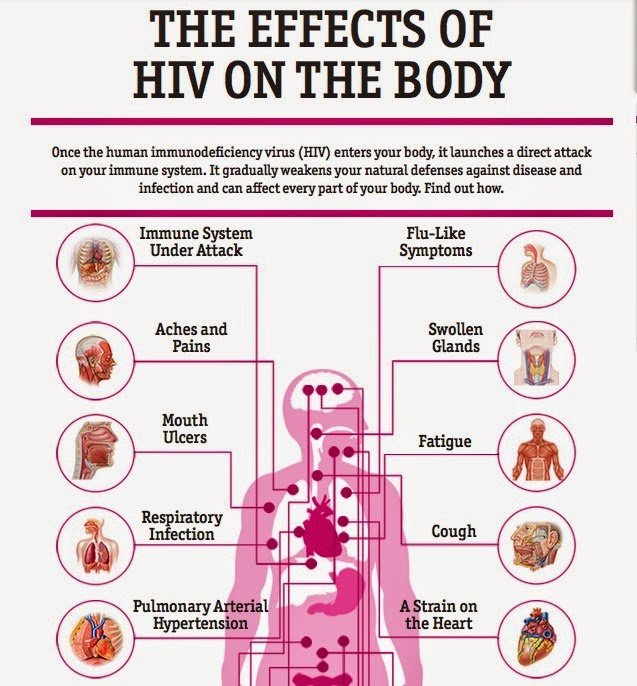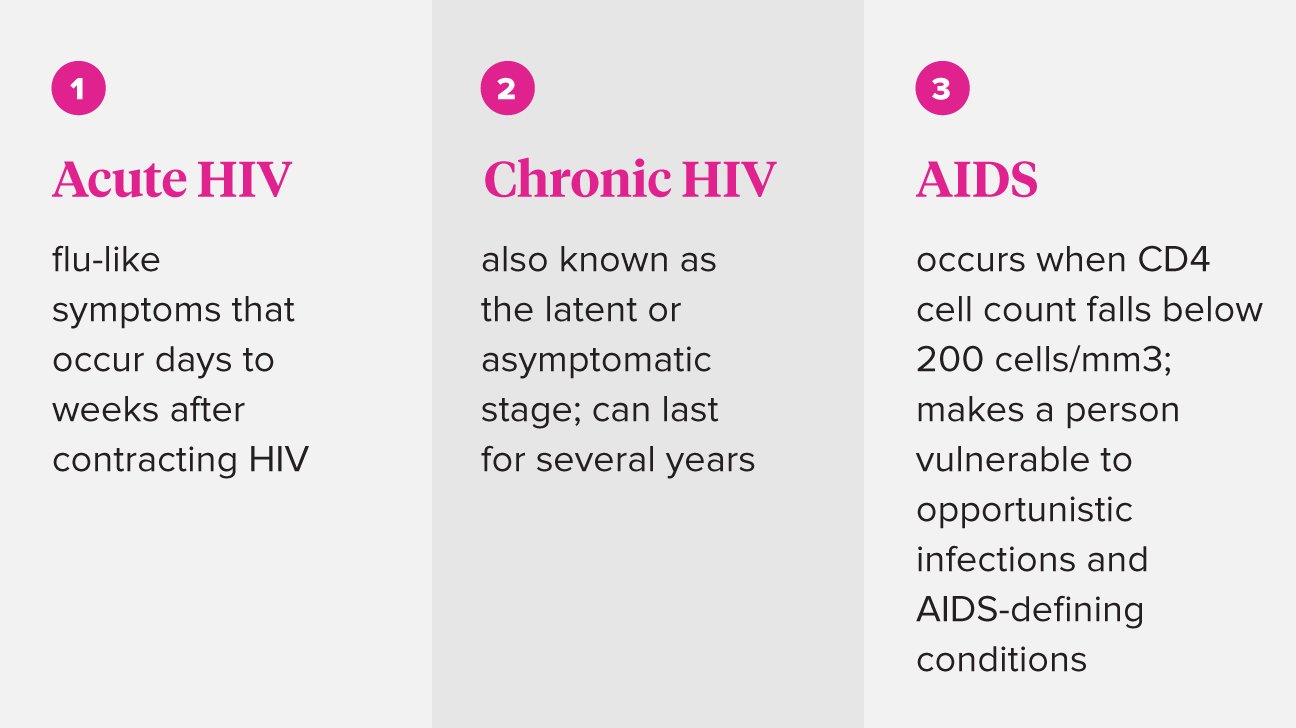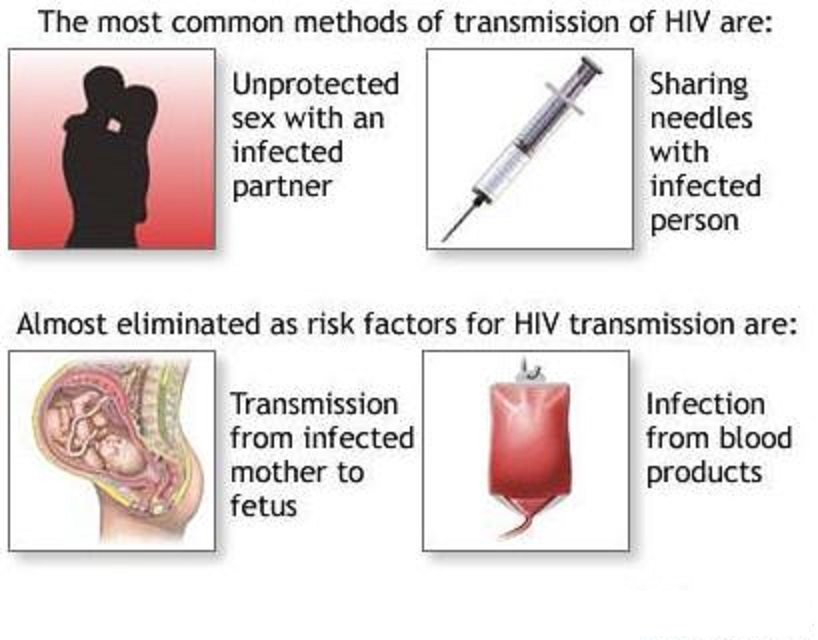Why Does The Immune System Fail To Fight The Hiv Virus
There are various reasons which can contribute to the failure of the immune system to control HIV infection and prevent AIDS development. By infecting CD4+ T cells, HIV is able to replicate predominantly in activated T cells and paralyse one of the main components of adaptive immune system. HIV can also establish latent infection in CD4+ T cells and remain invisible to CD8+ T cells and therefore replication can occur later in the infection and generate new virions. Antigenic mutation within the T-cell epitopes can affect the binding capacity of MHC molecules to the viral peptides, resulting in the inability of the TCRs to recognise the MHC-peptide complex. Finally, HIV is able to hide from anti-HIV antibodies by expressing non-immunogenic glycans on key antibody epitopes.
Signs Of Hiv Infection In Children
HIV- infected children may develop a number of signs and symptoms as a result of their HIV infection. However, HIV-infected children may have many years when they have no major health problems and they look, grow and act as other children. After a while the HIV virus may cause certain symptoms. However, some of these signs may also occur in children who have no medical problems at all. Or they may occur in children with other immune system problems.
Some of the more common signs in HIV-infected children include:
- Infections that keep coming back, do not go away or are more severe than in other children
- Swollen glands in more than one area
- White patches in the mouth, on the tongue or in the throat that dont go away
- Repeated fevers
- Slower growth and development than other children the same age
- Diarrhea that continues for several weeks
- Repeated ear infections
- Certain kinds of tumors or cancers
The Effects Of Alcohol On The Body
those suffering from HIV/AIDS, Alcohol can have negative effects on people living with HIV, both on their bodies and how they behave. On the body, alcohol can weaken the immune system and lower CD4 counts. The effects of alcohol on HIV infection depend on how much a person drinks. A number of studies have found that heavy drinkers and those with alcohol problems have lower CD4 counts than moderate drinkers and are likely to have more copies of the HIV in their body. Regardless of how much you drink,
You May Like: Nba Youngboy Have Herpes
Innate Immune Response To Hiv
Innate immune cells are the first line of defence which HIV encounters upon entry to the body.
Macrophages. Tissue macrophages are one of the target cells for HIV. These macrophages harbour the virus and are known to be the source of viral proteins. However, the infected macrophages are shown to lose their ability to ingest and kill foreign microbes and present antigen to T cells. This could have a major contribution in overall immune dysfunction caused by HIV infection.
Dendritic cells . DCs are large cells with dendritic cytoplasmic extensions. These cells present processed antigens to T lymphocytes in lymph nodes. Epidermal DCs, expressing CD1a and Birbeck granules, are probably among the first immune cells to combat HIV at the mucosal surfaces. These cells transport HIV from the site of infection to lymphoid tissue. The follicular DCs, found in lymphoid tissue, are also key antigen-presenting cells that trap and present antigens on their cell surfaces. In the lymph node follicles, DCs provide signals for the activation of B lymphocytes.
What Does Hiv Do To Your Body

Known as the human immunodeficiency virus, HIV primarily infects a type of white blood cell found in your immune system called a CD4+ cell . White blood cells are immune system cells that protect your body against both infectious diseases and potential foreign invaders. As the HIV virus progresses, without the intervention of treatment, the continuous destruction of white blood cells inevitably leads to a weakened immune system and consequently increases the risk of contracting wider ranges of opportunistic infections .
Also Check: How Long Does It Take For Hiv To Become Aids
Antiretroviral Treatment And The Hiv Lifecycle
Antiretroviral treatment for HIV combines several different types of drugs, each of which targets a different stage in the HIV lifecycle. This means that the replication of HIV is stopped on multiple fronts, making it very effective.
If taken correctly, it keeps the immune system healthy, prevents the symptoms and illnesses associated with AIDS from developing, and means that people can enjoy long and healthy lives.
If someone doesnt take their treatment correctly or consistently , the level of HIV in their blood may increase and the drugs may no longer work. This is known as developing drug resistance.
Protecting Your Child From Other Infections
The HIV-infected child has more trouble fighting off infections than other children. So you need to keep the child away from people who are ill with the flu, colds, measles, chickenpox and other common diseases.
- Your child should be allowed to play with other children. However, do not allow play with others that places the HIV-infected child at risk for infection . Tell your doctor if your child has been exposed to any diseases.
- Just as for all children, the HIV-infected child should not share toys that he has put in his mouth or that other children have put into their mouths. The child’s toys should be scrubbable, safe and clean.
- The HIV- infected child may use the same bathroom and toilet facilities as other family members.
- Pets that bite or scratch should be kept away from an HIV- infected child. Reptiles and cats carry infections that are dangerous to HIV- infected children. These pets should be avoided. Check with your doctor before bringing pets into your home.
You May Like: Nba Youngboy Truth About Herpes
How Is Hiv Recognized
Doctors use laboratory tests to confirm HIV infection. The Elisa and Western Blot analyses identify people who have been exposed to HIV. These tests determine if the blood contains particular antibodies that result from contact with the virus. They do not identify who among a group of infected individuals will develop the disease. The presence of antibodies or HIV markers means the person has been infected with HIV but no one can predict when and if they will get AIDS related symptoms.
Doctors diagnose AIDS by blood tests and the presence of specific illnesses such as pneumocystis carinii pneumonia or Kaposi’s sarcoma. These diseases overcome the weakened immune system and are responsible for the high death rate among AIDS patients.
How Long Does It Take To Develop The Disease
There is no fixed period between the first contact with HIV and the development of the disease. Signs and symptoms resulting from infection with HIV develop in stages. Many infected individuals may have no symptoms for several years. But others may develop symptoms within three years from the time of infection.
Symptoms of HIV infection are fever, swollen lymph glands in the neck and armpits, sweating, aches, fatigue, unexplained weight loss and diarrhea.
Within eight years, about 50 percent of all infected people develop specific conditions categorized as AIDS. These conditions include a lung disease called “pneumocystis carinii pneumonia,” skin tumours called “Kaposi’s sarcoma,” fungal and viral infections such as candidiasis and herpes zoster, and severe diarrhea.
Some AIDS patients also suffer from dementia resulting in problems with memory and thinking. AIDS patients are prone to various infections of the brain, just as they suffer from an unusually high number of cancers, bacterial and viral infections of other parts of the body.
Also Check: How Long Can Hiv Be Dormant
Hiv Infection And Cancer Risk
Infection with HIV weakens the immune system and reduces the body’s ability to fight viral infections that may lead to cancer .The viruses that are most likely to cause cancer in people with HIV are :Kaposi sarcoma-associated herpesvirus , also known as human herpesvirus 8 , which causes Kaposi sarcoma and some subtypes of lymphoma
Stages Of Hiv Infection
About a month after you get HIV, you might feel like you have the flu. This is the first stage, called primary or acute HIV infection. Symptoms include:
- Fever
- Fatigue
- Swollen lymph nodes
The next stage is called clinical latency, or chronic infection. You might have no symptoms, or only mild ones, for 10 years or more.
Without treatment, as HIV keeps multiplying inside your body, youâll move into the third stage, which is AIDS. A person who has HIV is diagnosed with AIDS when they have fewer than 200 CD4 cells per cubic millimeter of blood or when they get whatâs called an AIDS-defining condition.
AIDS-defining conditions are certain cancers and illnesses called opportunistic infections.
Read Also: What Does Hiv Screen 4th Generation Wrfx Non Reactive Mean
What Are The Symptoms Of Hiv/aids
The first signs of HIV infection may be flu-like symptoms:
- Swollen lymph nodes
- Mouth ulcers
These symptoms may come and go within two to four weeks. This stage is called acute HIV infection.
If the infection is not treated, it becomes chronic HIV infection. Often, there are no symptoms during this stage. If it is not treated, eventually the virus will weaken your body’s immune system. Then the infection will progress to AIDS. This is the late stage of HIV infection. With AIDS, your immune system is badly damaged. You can get more and more severe infections. These are known as opportunistic infections .
Some people may not feel sick during the earlier stages of HIV infection. So the only way to know for sure whether you have HIV is to get tested.
How Does Google Determine E

Now that weve answered the question What is E-A-T?, lets talk about how Google determines the E-A-T of a page. At a high level, there are three primary components listed in the Google search quality evaluator guidelines:
- The expertise of the creator of the Main Content.
- The authoritativeness of the creator of the Main Content, the Main Content itself, and the website.
- The trustworthiness of the creator of the Main Content, the Main Content itself, and the website.
Read Also: Does Cookie Johnson Have Aids
Recommended Reading: How Long Does Hiv Take To Show
What Are The Treatments For Hiv/aids
There is no cure for HIV infection, but it can be treated with medicines. This is called antiretroviral therapy . ART can make HIV infection a manageable chronic condition. It also reduces the risk of spreading the virus to others.
Most people with HIV live long and healthy lives if they get and stay on ART. It’s also important to take care of yourself. Making sure that you have the support you need, living a healthy lifestyle, and getting regular medical care can help you enjoy a better quality of life.
How Does Hiv Affect A Persons Life
An HIV infection is caused by a virus. By damaging CD4 T cells, it targets and gradually weakens the immune system. As a result of this damage, the body becomes less capable of fighting off other infections over time. Infections that are typically mild can become life-threatening if the immune system is compromised enough.
Recommended Reading: Hiv From Semen
How Asthma Affects Your Body
Asthma is a disease that affects the airways of your lungs. With asthma, your airways’ lining tends to always be in a hypersensitive state characterized by redness and swelling . It’s similar to how your skin becomes red, irritated and sensitive after a sunburn. This hypersensitive state makes the airways react to things that you …
What Organs Do Hiv Affect
People with advanced HIV are more likely to develop it than the general population. There are red or dark purple lesions on the mouth and skin that are indicative of this condition. In addition to causing lung problems, it can also affect the digestive tract and other internal organs. A person who has HIV or AIDS is also at a greater risk for developing lymphomas.
Read Also: Nba Youngboy Aids
Hiv And How Is It Different From Hiv Aids
What exactly is AIDS and how is it different from HIV ? AIDS is a severe form of HIV in which someones immune system is completely destroyed HIV is a virus that affects the immune system. In other words, you can have HIV without AIDS, but if you have AIDS, then you automatically have HIV. The origin of HIV is disputed between scientists some have theorized that it was passed down from apes and somehow transferred between humans. HIV attacks the bloodstream and eliminates
Protect Yourself From Hiv/aids
HIV and AIDS in South Carolina
- In South Carolina, almost 15,000 of your neighbors including about 200 children and teens are living with HIV infection or AIDS.
- Throughout the United States, more than 1 million residents are living with HIV or AIDS, and nearly one-fifth do not know they have it.
- Each year, more than 56,000 new cases are diagnosed. An estimated 600,000 U.S. citizens have already died from the virus.*
- Worldwide, more than 60 million people, including millions of children, have been infected since the early 1980s. As many as 25 million people have died from AIDS.**
*U.S. Centers for Disease Control and Prevention.** Joint United Nations Programme on HIV/AIDS
Don’t Miss: How Long Does Hiv Stay Dormant
How Does Hiv Affect The Body Immune System
An HIV infection is caused by a virus. By damaging CD4 T cells, it targets and gradually weakens the immune system. As a result of this damage, the body becomes less capable of fighting off other infections over time. Infections that are typically mild can become life-threatening if the immune system is compromised enough.
Adjusting To Life With Hiv

Life involves emotional stresses and strains. Being diagnosed with HIV, and living with it, will at times cause such stresses, and some aspects of your life will become more complicated and possibly stressful because of HIV.
Finding out that you have HIV can lead to a wide range of feelings. It is common to feel fear, uncertainty, worry, concern about what other people will think, guilt, shame, embarrassment, anger and sadness after a diagnosis. Some people feel numb, and others feel a sense of relief that they have finally found out about their status.
It can be easy to assume the worst about life with HIV. Its possible that, before your diagnosis, no one told you that HIV treatment is now so effective that most people with HIV can expect to live as long as people who dont have HIV. Or that the medications also prevent the sexual transmission of HIV if you take anti-HIV drugs and have an undetectable viral load, you wont pass HIV on to your sexual partners.
The feelings people have about HIV can change over time, so your initial response to finding out that you have HIV is unlikely to last. Many people find that they gradually come to terms with having HIV, although some aspects of being HIV positive can still make them feel anxious or distressed.
Its also important to know that theres a lot you can do to look after your emotional wellbeing.
Read Also: Does Youngboy Really Have Herpes
Children With Weak Immune Systems
HIV A persons overall health should not be threatened due to temptation of risky sexual behavior. People with weak immune systems are in danger of contracting HIV because the progress of the virus can not be stopped. There are some people in the world that can not contract HIV because of their complex immune system. Over the years their genes have grown resistant to certain infections but their are people with very weak immune systems which makes HIV very dangerous for them HIV attaches
Can Hiv Be Prevented Or Avoided
The best way to prevent HIV is to not have sex with a person who has HIV, or share a needle with a person who has HIV. However, there is also a medicine called PrEP that people can take before coming into contact with HIV that can prevent them from getting an HIV infection.
PrEP stands for pre-exposure prophylaxis. It is for people who are at long-term risk of getting HIV either through sexual activity or by injecting drugs. If youre taking PrEP and come into contact with HIV, the medicine makes it difficult for HIV to develop inside your body.
Other ways to prevent HIV include:
- When you have sex, practice safer sex by using a condom. The best condom is a male latex condom. A female condom is not as effective but does offer some protection.
- Do not share needles and syringes.
- Never let someone elses blood, semen, urine, vaginal fluid, or feces get into your anus, vagina, or mouth.
Also Check: Youngboy Has Herpes
How Does Acute Hiv Affect The Body
Once a person contracts HIV, the acute infection takes place immediately.
Symptoms of the acute infection may take place days to weeks after the virus has been contracted. During this time, the virus is multiplying rapidly in the body, unchecked.
This initial HIV stage can result in flu-like symptoms. Examples of these symptoms include:
- myalgias, or muscle pain
However, not all people with HIV experience initial flu-like symptoms.
The flu symptoms are due to the increase of copies of HIV and widespread infection in the body. During this time, the amount of CD4 cells starts to fall very quickly. The immune system then kicks in, causing CD4 levels to rise once again. However, the CD4 levels may not return to their pre-HIV height.
In addition to potentially causing symptoms, the acute stage is when people with HIV have the greatest chance of transmitting the virus to others. This is because HIV levels are very high at this time. The acute stage typically lasts between several weeks and months.